Chris Baty's Blog, page 10
May 18, 2023
Read the YWP Novel Excerpt Contest Official Runners-Up!
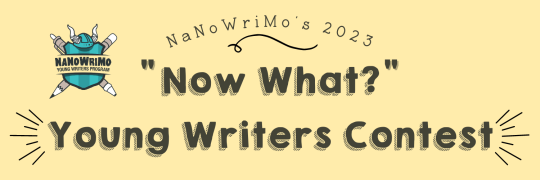
In February, we challenged you to submit a 400-word excerpt from your NaNoWriMo novels. From over 650 fantastic entries, we chose two Grand Prize Winners and four Runners-Up. We hope you enjoy reading them as much as we did! (For more excerpts, check out this forum thread.)
I cross my arms and stare across the street to where he stands—my village’s new found savior—the man who had killed the beast that plagued our village for over a decade. I take a swig out of my waterskin, watching as he smiles at the young children skipping around him; one comes up to him and offers up a flower crown. I try and hide my disgust, for even if the beast is gone, I do not trust his smile…Read the Rest!
Ivy gasped for air, rapidly sitting up. Her hands were knotted in the bedsheets and she was dripping with sweat. She’d jolted awake several times in the last few weeks, and it had been becoming more frequent. But there was something different tonight– it was as if her soul had been sucked from her body…Read the Rest!
The hologram places a hand to his chest in an exaggerated motion, so that the translucent red light of his fingertips brushes against the armillary sphere at the center of his chest. Steam rises from beneath him, where rainwater mixes in with discarded oil and whiskey to create tar-black reflections…Read the Rest!
Astoria’s older brother Eryx squeezed her hand as the line grew shorter. She adjusted her skirt, fiddling with the small wrinkle her iron had not removed. Her rattan sandals squeaked as she edged closer to the thick rope separating the snake of commoners with the highest-ranked officials. She found a folded napkin in her pouch and wiped her sweaty palms. Today had to be perfect, and she had to receive an element that would please her elite family. Though she had been only five at the time, Astoria knew what had happened to her older sister…Read the Rest!
May 17, 2023
Read the YWP Novel Excerpt Contest Grand Prize Winner (13 and Under Age Group)!
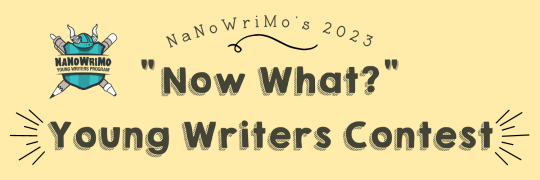
In February, we challenged you to submit a 400-word excerpt from your NaNoWriMo novels. From over 650 fantastic entries, we chose two Grand Prize Winners and four Runners-Ups. We hope you enjoy reading them as much as we did! (For more excerpts, check out this forum thread.)
I slip there unnoticed, and sure enough, Willow slumps against the fence. Her arm is through the hole, beads of blood glinting on the metal where it bit into her skin. She clutches at the twisted metal as though it is a portal to a better place.
And maybe… maybe it is.
But maybe it isn’t. And that’s what’s kept us from running for all these years.
“Hey, Wil,” I whisper, sliding to the ground beside my sister, my anger forgotten, the pain in my cheek and my heart pushed into a place where I can’t feel it. My sister… she’s more important than any of that, than anything. “What’s going on?”
Willow turns to me suddenly, her face red and blotchy, streaked with tears. Her eyes are like that of a wild animal: cornered and desperate and terrified. It scares me.
“Sage, I can’t!” she wails. “I can’t stop it! I can’t do it! I can’t not do it!” Her voice is pitched with distress, a hysterical edge to it that scares me.
I look at her with concern creasing my brow, coating my voice. “Willow?”
But suddenly, it isn’t Willow I’m looking at. It’s a fox, white as the first snow of winter, with oddly human, intelligent, pleading eyes.
Willow’s eyes.
I freeze in shock, staring at the fox that is Willow.
At Willow, who is a fox.
At my whole life, my whole world, being upended before my eyes.
And then—my sister is back.
I can’t stop the stories we’ve been told about the creatures outside the fence, magical and evil, from flashing through my mind. The stories that have always been applied to us. And even as I look at Willow, my Willow, who I have known and loved all my life, a small part of me can’t help but wonder if they’re true, if we are what they say we are.
Witches. Demons. Monsters.
But then, with a twist of revulsion aimed at myself, at the thing that just went through my mind, at Oke Darm and everyone living in it for conditioning me to think that way, I banish the unfaithful thought from my head. Because this is Willow, my Willow–no matter what form she takes.
But I know I’m the only one who will see it that way.
“Wil,” I whisper. “Willow… We have to run. Now.”
Guest author judge Sarah Suk had this to say about A Kingdom of Embers and Ash:
“In just this short passage, I was able to get a sense of the world, the stakes, and the bond between the characters in a way that made me instantly root for them (protect them at all costs!). Impressively told with a voice that shines.”

Hannah Gumpert is in 8th grade, and admittedly spends way too much time absorbed in a book. When she isn’t reading, you can usually find her with her family, at a coffee shop with her friends, or writing and/or imagining her latest story, completely deaf to the world because she’s living in another. Hannah wants to be a writer when she grows up — but she’s not going to wait around until then.
May 16, 2023
Read the YWP Novel Excerpt Contest Grand Prize Winner (14-18 Age Group)!
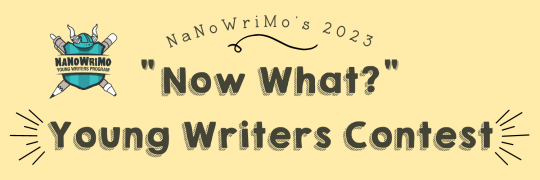
In February, we challenged you to submit a 400-word excerpt from your NaNoWriMo novels. From over 650 fantastic entries, we chose two Grand Prize Winners and four Runners-Ups. We hope you enjoy reading them as much as we did! (For more excerpts, check out this forum thread.)
The room was still thick with the torturous heat of the day, and Zahra’s hands were damp as she drew the wrapper from her pocket. She lay curled on her side under the room’s single window—a slit, really, in the thick wall—with her back to the other girls. Zahra concealed the waxy paper in her hands as a rush of adrenaline made her tremble.
Girls clung to the comfort of sleep all around her, their eyes shut tight. They didn’t want to wake up—especially tonight, when it was their turn to face the beasts again. Zahra hadn’t wanted to wake up either, but she had to.
For Lila…
Zahra smoothed out the wrapper silently, focusing on the feeling of the slick wrapper against her sweat-soaked fingers. She remembered wrappers like this from her childhood—bright and colorful, just like the sticky squares of fruit they held. She remembered folding the wrappers, transforming them into birds and flowers, and placing them wherever they would catch the sun.
And yet she could still recall the roughness of too-old, too-dirty bandages scraping against her fingertips. And then the shock of wet blood, and Lila’s voice whimpering, “Zahra, they took my hand…”
Adrenaline surged within her, and Zahra gritted her teeth. She hated this feeling—the way anticipation built up, making her sick and tense and terrified… and then crashed down to nothing, leaving her weak and shaking. Like nothing was in her control.
No.
Zahra gripped the wrapper, shifting to see it better in the dim light. She had this. This was in her control.
No one had seen her steal it from the floor of the transport truck. No one had seen her painstakingly crease her message in it.
No one saw her now.
She had control.
She could save her sister.
Zahra folded the wrapper with precision—despite her fears, she hadn’t forgotten how. She bent the wrapper around the message, forming a long, firm beak, a slender body, and two outstretched wings, itching to catch the wind.
Boots—combat boots, large and unmerciful—rang in the hall. The girls around Zahra finally stirred, getting to their feet and murmuring. It was time.
Zahra’s stomach lurched as she stood on her toes to bring the folded wrapper to the window. She hesitated.
She had to let go now. Relinquish control.
And…
Save Lila.
Zahra let the sunbird fly.
Guest author judge Sarah Suk had this to say about Sunbird:
“A riveting piece of writing that made me think, “Wow, I want to read more.” I was completely immersed in the tension, the vivid descriptions, and the raw emotion of this scene. This is a writer to watch out for!”

Asenath Wetzel is a current senior in high school and is excited to study English in college this fall. She loves eating toast, watching clouds, and dancing, and she also enjoys pottery, needle felting, and watercolor. Her favorite authors are Georgette Heyer, Agatha Christie, and Brandon Sanderson. Asenath has recently found a love for writing short stories, and she hopes to write mystery and science fiction novels in the near future.
May 9, 2023
Tips for Writing When Struggling With Executive Dysfunction

Executive dysfunction can make writing challenging. NaNo participant, August, has some tips on dealing with task initiation and how to keep writing so you can reach your writing goals.
Embarking on a writing project is quite the undertaking. After years of sticking to short pieces, I decided to start working on my first novel last NaNoWriMo. However, it felt like I was fighting with my own mind to get things done.
Executive dysfunction is a term used to describe weaknesses in the cognitive process that organizes thoughts and activities, prioritizes tasks, manages time efficiently, and makes decisions. It’s common in certain disorders, such as Depression, ADHD, and autism. Executive function skills are used to establish structures and strategies and to determine the actions required to move a project forward. So for those of us who struggle with executive dysfunction, dedicating ourselves to a project could get quite overwhelming. Here are some little tips and tricks I’ve compiled throughout my experience.
How to start:Task initiationis one of the biggest struggles when dealing with executive dysfunction. This is especially hard with writing, since you need time to muster the energy needed to jump into your story. Here are some tips:
1. Start a 1-3 minute timer and force yourself to write something, anything, before it ends. The words that come out don’t matter.You can just write, “I don’t know.” The point is to force yourself into the writing zone.
2. Leave bread crumbs for yourself at the end of each writing session to make picking up where you left off easier. For example, stop in the middle of a sentence or thought, so the next time you write you won’t have to tackle something completely new. You just have to finish that incomplete thought and continue from there. You could also leave some notes about what happens next, cutting down thinking time in your next session.
3. Try free writing. This is a great way to get those creative juices flowing with minimal effort. Free writing alleviates the pressure of writing something good. Spend a few minutes writing about anything, like your day or a frustrated ramble about your story. It’s like a warm up before your writing session.
So you’ve started your writing session. How do you keep writing? Most importantly, how do you keep working on your project? When struggling with executive dysfunction, the regular “set a schedule” approach doesn’t tend to work.
1. Scale down your goal if your big, overarching goal for your project is overwhelming. Try changing your goal to something more manageable and short term. For example, try writing 500 words a day. This might make it less likely for you to lose steam half way through.
2. Try writing sprints if daily goals aren’t working. Instead of hitting a certain word count, you’re setting a timer and writing for its entire duration
3. Don’t feel bad for needing external motivation. Will promising yourself a pizza after you hit your goal motivate you to write? By all means, do so. Maybe you just need a friend to ask you if you’ve written at the end of the day. Find out what motivates you.
4. Find a writing buddy. This can be someone who can sit down and write at the same time to hold you accountable. Or it can be a critique partner that expects you to turn in something by a certain deadline.
5. Try something new. This is one of the best ways to combat how constraining and overwhelming your writing might feel. It’s okay to lose interest in your project for awhile and try something new. Unless you’re racing to meet a deadline, you have no obligation to keep working on a project that isn’t working for you. Setting a project aside doesn’t mean giving up on it. You might only need some time away from it before you are able to finish it.
Trying something new could also mean changing where or how you write. Usually write at home? Try a coffee shop. Do you usually type? Try hand writing. It might or might not work for you. But change could be quite refreshing for your mind.
6. Write whenever you can.
Sometimes the urge to write comes while you’re waiting for lunch to heat up, or right before you go to bed. Motivation can be hard to find with executive dysfunction, and designated writing times don’t always work. Have something on hand you can easily pull out to write with to take advantage of these moments. Jotting down a hundred words as you’re waiting for dinner to cool might not seem like much, but it’s still words contributed to your word count.
Some of these tips might work for you. Some might not. Writing successfully is mostly about finding what works and running with it. These are things I found helpful when I embarked on my first novel and I hope it would at least give you some ideas.
Happy writing!

August is a 19 year old self proclaimed nerd and aspiring writer. They are currently taking a gap year after high school and are planning to start their undergraduate psychology degree soon. They have been writing short poetry for two years and recently started work on their first fantasy novel. When not writing, they are busy reading or being a musical theatre enthusiast. Check out some of their writing on Instagram.
Photo by Miriam Alonso from Pexels
May 1, 2023
Journaling Practices to Help With Writing Funks

Feeling stuck in your writing? Journaling might be your answer to getting unstuck! NaNo Participant Ashley has some tips on using journaling as a guide to get you writing again.
We all know writing is no easy feat, and it can be especially difficult when we find ourselves in a funk. Sometimes it’s best to take a break, reset, and turn our energy elsewhere and inward to help us get re-focused on the goal ahead. So, whether you’re struggling to start a new work or find yourself stumped on writing that next chapter, try these tips to help you get over the hump.
A brain dump is exactly what it sounds like. Grab a journal and write down everything on your mind. It can be specific to what you’re currently working on, or just anything that’s taking up space in your head. Set a timer for 5 minutes and let the thoughts flow. If you find this difficult to do, maybe start with one of these prompts:
What are five things I accomplished today?
How can I prioritize myself and my everyday tasks better?
Are there any goals I’d like to accomplish this week/month/year?
Pro tip: Using the voice note app on your phone works just as well! Go for a walk or hop in your car for a drive and talk all your thoughts out until there’s nothing left to say.
2. Use a guided journalI’m a big fan of guided journals when I can’t seem to find the inspiration to write. Something about a journal prompt and the space to write freely about a variety of topics really helps me to get out of my head. There are a ton of guided journals out there, but these are a few of my favorites:
Rupi Kaur’s Healing Through Words
3. Keep a gratitude logOne of the best ways to get grounded and re-centered is by simply paying attention and being present to the world around us. Start your day or end your night making a list of 5-10 things you’re grateful for. You can even take it a step further by choosing 1 or 2 things from your list and going into more detail about why you’re grateful for it. Give yourself a few minutes every day for this practice, and by the end of the week you’ll have a long list to look back on and come back to when you’re feeling stuck.
4. Get into natureA change of scenery is another great way to switch up your writing routine. Find a new or familiar park, take a walk, and observe the nature around you. Take notes in your phone or in your journal of everything that comes to mind using your five senses (sight, sound, smell, taste, and touch). Get creative with what you jot down and write a poem from your observations, or perhaps a short story.

Ashleyis a content marketer by day and aspiring nonfiction writer by night. She’sbuilt a career of brand storytelling and now hopes to share stories from herown life on healing and self-care as she begins working on her first book. Follow her journey on Substack or Medium.
Photo by Charlotte May from Pexels
April 28, 2023
10 Tips for Fast-Drafting

Every year, we’re lucky to have great sponsors for our nonprofit events. Freewrite, a 2023 NaNo sponsor, is a dedicated distraction-free drafting device designed just for writers. Today, author Ashley Poston and the Freewrite team share some tips for completing a first draft of your novel quickly:
Hello from the Freewrite team! 👋 Here at Freewrite, we love a NaNoWriMo challenge, because we’re all about getting words on the page. We asked Author & Freewrite Ambassador Ashley Poston to share her best tips for fast-drafting and getting that first draft DONE!
No surprise, one of her secrets is her Freewrite. But what else does Ashley do to get those drafts done fast?
Here’s Ashley:
I have a confession to make: I hate drafting. It’s the bane of my existence. If I could reach into my brain and take out my story, fully-formed, and just work on the editing bit? I’d do it.
But, alas, that’s not how writing works. (Which is a real pity because I really do love editing. The way you go in with a fine-tooth comb and just torch the entire novel, then rewrite it for the third time. It’s truly majestic.)
Though after ten years, I’ve yet to figure out a way to pull a novel, fully-formed, out of my ears. So, instead, I like making the part of drafting as painless as possible… by doing the most painful, maddening, infuriating thing imaginable.
In other words: fast-drafting.
I’ve perfected the art. I can write a book in a week if I have enough caffeine and a death wish, and with these ten tips, so can you.
1. Find your characters.Truly, the most important part of fast-drafting is knowing your characters from the outset. In a first draft, you usually find your characters in the middle of the second-to-last chapter. (Or is that just me?) So it often helps to know your characters inside and out from the start. Not only that, but know how they’d react in certain situations, know what would be on their Spotify playlist, know whether they’d have a repertoire of Your Mom jokes up their sleeve. How do they take their coffee? If faced with ten seconds to live, who would they call? Most of these questions you’ll never answer in the manuscript itself, but it’s important to know these people in your head on an intimate level.
2. Use your time® wisely.Setting a timer can be a great way to increase your writing speed. Start with a short amount of time—maybe 15 minutes—and write like the wind, Bullseye! Then shake yourself out, set that timer to 15 again, and repeat. (This is SO easy on my Freewrite Traveler, because it has a feature that keeps time for you, making 15-minute sprints easy-peasy.)
3. Outline.In addition to your characters, you really should get to know your plot, too, and a great way to do that is making an outline! There are a bunch of different tips and tricks to outlining—I personally use Susan Dennard’s 1-page Synopsis whenever I need to hash out a plot, and Rachel Aaron’s 2k to 10k Blogpost from Ye Olde 2011.
4. No distractions!Writing is already hard enough, but it becomes almost impossible when you have a cat pronking on you every chance they get. Sometimes, life can just be that—distracting—and you can’t do anything about it. But minimize distractions wherever you can, especially if you’re sprinting. Turn off your phone! Disconnect the internet! And here is where I tell you my Freewrite has saved my butt countless times. I’m horrid at the whole “cut distractions!” bit, but with Freewrite, it’s easy as pie. It’s a lot like a typewriter, so internet? Never heard of her. iMessages? iThinkNot. It’s just you, your words, and the mounting existential dread of existence.
5. Compression gloves. (No, seriously, especially if you write every day.)This is gonna sound like one of those weird ones—and that’s because it is. But if you’re planning on writing every day for at least an hour, please do yourself (and your budding carpel tunnel) a favor and get some compression gloves. Learn some hand exercises. We don’t call writing fast “sprinting” for nothing.
6. Don’t look back.It’s so easy to get caught up in trying to perfect the prologue, but this can absolutely hinder you. Take it from someone who loves to make the first chapter perfect—you never will. I promise. Instead, focus on getting your ideas down on paper and worry about editing later. I promise that sentence you didn’t like will be there when you come back to it. It’s not going anywhere. This is another area where my Freewrite helps me focus.
7. Use prompts!Sometimes, your brain gets stuck. If you feel stuck, or in a corner, use a writing prompt to get the creative juices flowing again! Maybe you’ll never use the scene, but that’s OK. If it means you get going again? That’s what matters.
8. Stuck? Hit the bricks! Real winners quit. But like… not forever.Writing can be mentally draining, so it’s important to not push yourself too hard, and to take breaks when you need it. Take a walk, stretch, dance it out to ABBA—whatever helps you recharge. And then when you come back to the scene, you’re refreshed and rearing to go.
9. Chunk it up.Breaking up your writing into smaller, manageable chunks can make drafting so much less daunting. Instead of making the goal finishing the novel, just finish the chapter. Finish this scene. Sometimes, it helps if people set a goal for a certain amount of words a day, but I find that this often just leads to burnout a lot faster. Instead of a word count, set a goal for a scene instead. Turn off the word counter. A first draft doesn’t have to hit a certain number of words—it’s called a first draft for a reason.
10. Practice makes more practice.Like anything else you do, writing takes practice. I know I can easily hit 5k a day, but that’s because I’ve been writing professionally for a decade now. If you’re just starting out, don’t compare yourself to anyone else. (In fact, this is a great rule of thumb regardless.) Everyone writes differently, and everyone writes in their own time. No one ever asked Van Gogh how long it took him to paint sunflowers, did they? No one told Monet he was taking too long on his water lilies. Writing is an art, so let yourself enjoy it.
I hope this helps you, at least a little, write your next sexy dragon-shifter book! (Or whatever you’re working on.) Godspeed, and just remember: only you can write the idea in your head. Different writers can be given the same exact prompt, and every single story will turn out differently. Keep your eyes on your own paper, your heart full of joy, and chase that story only you can tell.
It’ll be worth it, I promise.
—Ashley
Reminder: Camp NaNoWriMo 2023 participants are eligible for a special Freewrite offer. Find all the details here.

Ashley Poston is the New York Times and USA Today best-selling author of The Dead Romantics. After graduating from the University of South Carolina with a bachelor’s in English, she spent the last decade working in the publishing industry before deciding to pursue writing full-time. When not writing, she likes trying various arts and crafts (she’s currently addicted to building miniature rooms) and taking long walks as an excuse to listen to Dungeons & Dragons podcasts. She bides her time between South Carolina and New York, and all the bookstores between.
April 27, 2023
“No words are wasted. Everything you get down on the page can...
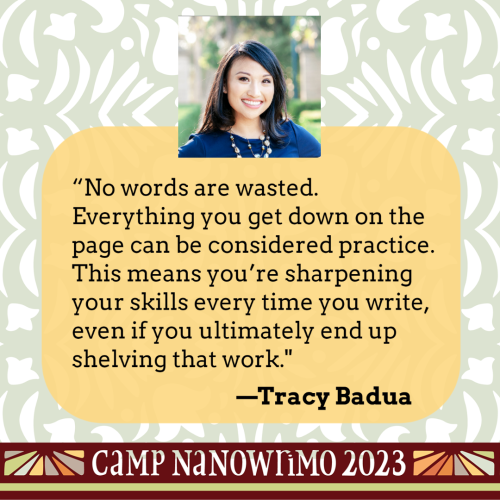
“No words are wasted. Everything you get down on the page can be considered practice. This means you’re sharpening your skills every time you write, even if you ultimately end up shelving that work.”
— Tracy Badua is an award-winning Filipino American author of books about young people with sunny hearts in a sometimes stormy world. By day, she is an attorney who works in national housing policy and programs, and by night, she squeezes in writing, family time, and bites of her secret candy stash. She lives in San Diego, California, with her family.
Check out Tracy on Twitter, Instagram, or TikTok!
Read more camp care packages here!
April 25, 2023
Angst: How to Hurt Your Characters and Make It Count

As a writer, you’re probably familiar with putting your characters through painful situations. But how can we make all that suffering worth it? NaNo Participant Liz Generally has some advice on how to write effective angst!
Arabella K Federico said, “Write pain so effectively, your readers will be begging for it to end.”
When you find yourself emotionally invested in your characters, hurting them can feel outright wrong. But sometimes, for the sake of your story, you just have to push them off the cliff (metaphorically or physically!)
Make it hurt. Dig deep, and reach into the darkest pits of emotional and physical pain. Give your readers a reason to break for your character. There are a few methods you can use to do this.
1. Physical Pain
Pain is a powerful motivator. It can cause people to act out of character, lash out, create out-of-character emotional outbursts or realizations, or show previously unknown care. This can also make your character more relatable to your readers. Pain doesn’t just affect the person experiencing it!
2. Mental or Emotional Pain
What is your character’s worst fear? The nightmare that keeps them up at night? Are they afraid of losing someone close to them? Are they terrified of leaving someone behind? Use that to heighten the consequences of a scene. Characters who experience intense emotional or mental pain become more real to your readers, especially if they have experienced similar mental or emotional pain.
3. Spiritual Pain
Although spiritual pain generally results from either physical, mental, or emotional pain, it can be a very effective method to hurt your character and create angst. How can you make your reader question their faith or lack thereof? If they are very spiritual, can you make them believe their god or deity doesn’t exist? If they don’t believe in a deity, can you make them believe in one? Spiritual pain can be the most excruciating to read when done well.
So how do you amplify the pain? What can you use to make the pain more graphic, intense, and palpable?
1. Dig deep into your own personal experiences.
Using your own pain as inspiration will help you ensure that what you’re writing is authentic and raw. Chances are, at least some of your readers have experienced something similar.
2. Use words that evoke not only emotion but physical sensation.
If you are struggling to write a specific scene, outline it. Write a list of each of the five senses and a list of all of the thoughts that your character might feasibly think. You should write at least one or two from each sense, and a few thoughts (if your chosen point of view allows for it) into the scene to create a full sensory profile.
3. How does your setting affect the pain you’re writing into the scene?
If your character is in love with someone, and the angst happens at a wedding, what is happening around them to increase the pain they feel? Is their love interest marrying someone else? What are they feeling or seeing that could make that pain worse? Is the song playing a song they imagined dancing with them to at their own wedding? Does the wedding look like the one they always imagined having with them? Are they standing beside them trying to pretend they don’t wish with every fiber of their being that they were the ones getting married?
Angst doesn’t have to be physical. It does have to connect with your reader. When you use multiple types of pain, utilize your own experiences, use all of your senses, and your setting to its full potential, there are unlimited ways to create angst that will have your readers begging you to put your characters out of their misery. Have fun hurting your characters!

Liz Generally is a romance author, wife, and mother to two girls and two dogs living in Oklahoma City. Liz is passionate about helping people and raising awareness for congenital heart disease. When she isn’t writing, she can be found spending time with her family and friends, volunteering, crafting, or cheering on her favorite hockey team. Liz is the author of Never Gonna Let You Fall, Alpha Mine, Blood Dreams, and Through The Flames all available on Kindle Vella.
Photo by Abigail on Unsplash
How to Unstick Your Camp NaNoWriMo Project

Every year, we’re lucky to have great sponsors for our nonprofit events. ProWritingAid, a 2023 NaNo sponsor, helps you turn your rough first draft into a clean, clear, publish-ready manuscript. Today, author Krystal N. Craiker shares some tips on how to push through to the end of your writing project when you’re feeling stuck:
Camp NaNo is the ultimate test of your creativity. You push your writing skills and habits to a new level.
It’s inevitable that at some point this month—or any time when you’re writing a novel—you’re going to get stuck.
You’ll run into a plot conundrum, or you’ll feel creatively drained. You’ll stare at the page and have no clue what to write next.
It happens to all of us, so don’t worry. Here are some of my favorite ways to get my stories unstuck and my creativity flowing once again.
1. Go OutsideWriting is an isolating process, and writers are notorious for losing hours of the day to the computer screen. But when you’re stuck in a rut, staring at the page stressed out doesn’t make things better.
Get up. Go get a drink of water. Then go outside. What you do next doesn’t matter. You can get some exercise in or drive to the coffee shop. Birdwatch, play with the kids, splash in some puddles—you get the idea.
A little movement and some sunshine will help you feel refreshed when you sit back down at the computer.
2. Brain DumpThis is my tried and true method for NaNoWriMo. When I reach a point in my novel that I don’t know what to write (or just don’t want to write), I insert a random brain dump.
I’ll write what I’m feeling about this scene and type out what I think the issue is. Sometimes, it’s just a bulleted list and others it’s a stream-of-consciousness flow. Here’s an example:
“I don’t know what to write here. I was going to kill off that character but didn’t. Somehow I need to get to X plot point from here. How do I do that? This is so frustrating. Now that I didn’t kill them off, I need a good reason for them to stay in the story. What are their motivations?”
If that’s all you write during a writing session, that’s okay. You were still working on your novel, so it still counts.
3. Use AIIt’s the first NaNo event since Chat GPT opened to the public and countless AI tools are popping up. AI can be a great way to brainstorm and spark inspiration.
As writers, we often get hung up on finding the perfect way to say something. But you don’t need to let one sentence slow down your writing flow.
Rephrase by ProWritingAid is a brand-new feature meant for writers like you. You can highlight any sentence, click Rephrase, and generate a new sentence. Shorten or lengthen a sentence, change the tone to formal or informal, or add sensory detail.
Here’s a boring sentence I wrote: “Quinn entered the dark and cold forest.”
And here’s a sentence Rephrase gave me: “Quinn shivered as he stepped into the cold, dark forest, the air thick with the scent of damp earth.”
I can build off that! Now I’m more excited to write this scene that was feeling bland.
Sign up for ProWritingAid to get access to Rephrase and more than 20 in-depth writing reports.
4. Keep GoingWhatever you do, don’t give up! Getting stuck is part of the process. When you hit that creative wall, give one of these methods a try.
Your story still wants to be written, so keep writing.

Krystal N. Craiker is the Writing Pirate, an indie romance author and content writer who sails the seven internet seas, breaking tropes and bending genres. She has a background in anthropology and education, which bring fresh perspectives to her romance novels. When she’s not daydreaming about her next book or article, you can find her cooking gourmet gluten-free cuisine, laughing at memes, and playing board games. Krystal lives in Dallas, Texas with her husband, child, and two dogs.
Top photo by Kelly Sikkema on Unsplash
April 19, 2023
A Fond Farewell to NaNoWriMo Technical Director Dave Beck
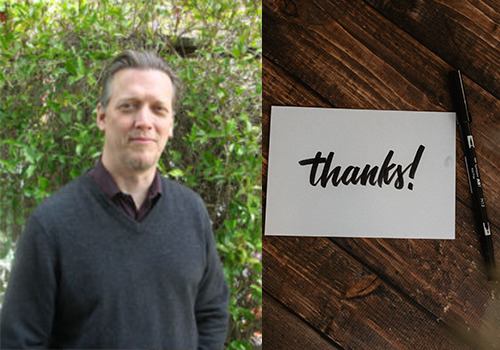
We’ve got some truly bittersweet news: after almost 10 years as NaNoWriMo’s Technical Director, Dave Beck is moving on. Dave joined NaNoWriMo in 2014 and since then has overseen all things site and tech-related for NaNoWriMo and Young Writers Program. In addition to his considerable technical skills, Dave is a true Renaissance man with a remarkable range of skills, interests, and hobbies.
Thanks to Dave and our other long-time Software Developer, Jezra Lickter, both our websites are currently in very stable places for this transition.
Before we say goodbye, Dave shares some thoughts about his time at NaNo:
Q: What are some of your proudest achievements at NaNoWriMo?I’d say it’s the redevelopment of the Young Writers Program website, which started in 2015. The first version of the website didn’t have many participants. I worked with Marya and Chris [Angotti] for the redesign. However, the biggest risk was creating a writing space for the kids. This feature did not exist before, so we built it from scratch. When we first launched it, 40% of the kids were writing on the site. The number is still going up. It’s 84% at the moment. I didn’t expect it to be this successful. Last time I looked, 20 billion words were written!
The second achievement: we haven’t lost a single word ever since the writing space was created. It was very important to me that we did not lose any of the kids’ novels.
In general, the YWP site was the most fun.
The design is the best part. Not the coding itself, but deciding what things we should do and how to get there. When you figure out a design and then develop it, it’s very satisfying when it works well.
It’s also fun being able to creatively collaborate with people, especially with the YWP. I’ll miss Marya and Jezra a great deal, it was very productive.
I’ve never won NaNoWriMo! Not even close to it. The closest I’ve gotten is 5k. It was a nonfiction book about ADHD.
The funny thing is, when I was a kid, I wanted to be a writer. But I didn’t want to write books! I just wanted to be F. Scott Fitzgeraldand go to cocktail parties.
I do NaNo every year though. It helps me understand the website and see if everything is working as it should be. So instead of writing, I see the problems and go and fix them.
I’m a veteran career changer. I’m leaving programming and coding to become a winemaker. Before this, I was an attorney. I’m still a member of the California Bar actually. I was also a reporter for the LA Press, a fancy sous chef in Boston, and an exhibit designer at the San Francisco science museum.
If you can’t tell, I have ADHD. I liked this job the most since it’s so complicated being a full stack developer. It works well with ADHD because I’m constantly switching what I’m doing.
Q: Are coding and noveling at all the same?? Inquiring minds want to know.A little bit? There is an element to understanding narrative within a code. You want to understand the order and how the code does certain things. It’s kind of like plotting a novel.
Designing code is also a creative process. But the coding itself shouldn’t be, which is the biggest difference. Coding is standardized so it won’t cause problems, especially when multiple people are working on the code.
With novel writing, you can do whatever you want. You can even break rules to prove a point. You don’t want to do that with coding or you break the whole thing!
Q: What will you miss/not miss the most at NaNo?I’ll miss the creative relationships I had with Marya and Jezra. It’s interesting and fun work. NaNoWriMo also had a lot of creative lunches before COVID. Once, we all created our own cocktails!
I won’t miss how sometimes, it feels like I’m reinventing the same wheel over and over. For example, we’re trying to refine the system that makes challenges for existing novels. It’s still not completely working right in the way we want it to be, so we end up spending a lot of time on it. It’s like Sisyphus. You think you’ve finally completed something and then we’re back at the bottom of the hill.
Q: Any advice for a developer working at NaNoWriMo, or any aspiring tech developers?Learn all seven parts of full stack developing as fast as possible. You will need it. Rely heavily on Jezra too. He knows a lot.
For aspiring tech developers, you should only spend 10% of your time actually coding. The other 90% of your time should be spent planning, scoping, and user testing. One of my issues is jumping into a code without a plan, which leads into problems I could have avoided. You should plan for things ahead of time. It’s like scoping your whole novel before writing words down. I’m a pantser coder which isn’t necessarily the best thing.
Q: Since you’re so fond of the YWP site, how about advice for any young writers?Think for yourselves and write what you want to write. If it’s what you’re interested in, you’ll have fun.
Interested in learning more about open positions at NaNoWriMo? Sign up here to be notified of job postings. Just as we celebrate the diversity of our creative community, we want our staff to reflect that same spirit of inclusion, and we will encourage candidates of all races, genders, cultures, class and educational backgrounds, abilities, and orientations to apply.
Chris Baty's Blog
- Chris Baty's profile
- 63 followers



